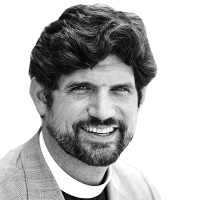The opposite of faith is not doubt. The opposite of faith is certainty.
That is a bit of proverbial wisdom that I have often shared with others on my faith journey that led to being ordained as an Episcopal priest this past January. I share it because it rings true to my experience, not merely as a Christian, but as a Cubs fan.
There has been no greater certainty in American sports over the last century than that the Cubs will lose. Seasons change. The players change. Management changes. And still the Cubs lose.
With the exception of a few magical, yet heartbreaking, seasons that most Cubs fans can recite from memory, regardless of whether they were alive to witness them or not (1969, 1984, 2003), losing has been a certainty for Cubs nation. In spite of that certainty, our hopes of a World Series championship sprout each spring like snow crocuses valiantly breaking through the remnants of great Midwestern snow banks. Maybe this will finally be our year.
For the last 106 years, that has proven not to be the case. But the Cubs are now in the midst of a once-a-quarter-century magical playoff run that has us fans saying, maybe the 107th time is the charm!
Most sports fans and right-minded folk look at Cubs fans and shake their heads. “Why do this to yourself?” they ask. Life could be so much easier and more enjoyable with another team or another sport.
What these well-intentioned and perfectly rational people fail to understand is that being a Cubs fan is not a matter of winning or losing (and let’s be honest, it’s mostly losing) but a way of life. It is about maintaining the hope of victory against overwhelming odds. And it is about finding identity as part of a community that acknowledges the reality that the world is not as we would like it to be, and yet finds meaning and joy in facing that reality together.
The truth is that many of us did not choose this life of fandom for ourselves, just as we did not choose our religion. Rather, like so many aspects of personal identity, it was handed down to us. That was certainly the case for me.
I am a fourth generation Cubs fan. Like my faith, my identity as a Cubs fan was passed down to me through four generations of women. It is common to inherit one’s faith from the women in one’s family. That is not nearly as prevalent with sports fandom, however. The fact that my dedication to the Cubs has been handed down through four generations of women is unusual, and a matter of great pride.
My great-grandmother Edna was born in Chicago in 1900, among the first generation of her German immigrant family to be born in the United States. She came of age as jazz and prohibition arrived in the Windy City. She joined the thousands who marched through her city’s streets demanding that women be granted the right to vote. And in the midst of all that, she came to love a baseball team that made its home on the north side of town—a team that brought glory to the city in her childhood by winning a World Series title.
Edna married and had three daughters, whom she raised in Chicago. Each year, she took them to see the Cubs play at Wrigley Field on Ladies’ Day, when the price of admission for women was just 10 cents. Edna and her husband eventually moved their family from the city to rural Michigan where my grandmother Grace finished high school, met my grandfather, and started a family of her own in a home situated next door to her parents.
My mother Marcia and her siblings grew up making the short trek to visit their grandmother on a near daily basis. On spring and summer afternoons, they would join Edna as she sat in her favorite chair, with her feet up and a small glass of beer in hand, listening to the Cubs game on the radio or watching it on TV.
After I was born, my mother asked Edna to be my godmother. She was present at my baptism, when I was initiated into the fellowship of Christian believers. Edna died just a few years later before I could have any conscious memories of her.
As I grew up, my mother and grandmother shared stories of my great-grandmother Edna with me—stories of her devotion to the church where my mother had been baptized, and where my grandmother served as organist for decades. And they shared these stories of her devotion to the Cubs. It was the telling and re-telling of these stories that shaped my own identity—both as a Christian and a Cubs fan.
I could not be more grateful for these two aspects of my identity. And I appreciate the commonality between them. Fundamental to both is the deeply held belief that someday all the pain and suffering we have experienced in this life will come to an end through a great act of reconciliation. Cubs fans anticipate the moment when their dreams of a World Series title will be realized. Christians anticipate the return of Christ, when God will “wipe every tear from [our] eyes. Death will be no more; mourning and crying and pain will be no more,” as is promised in one of my favorite scriptural passages found in the book of Revelation.
Lord knows Cubs fans have shed plenty of tears that could use wiping away.
It would be fair to say that both Christians and Cubs fans live with a measure of fear of what might happen should these long anticipated hopes ultimately come to fruition. The certainty of the known remains easier to live with than the anticipated unknown, no matter how glorious its promise. And yet our faith pushes us to long for that gloriously uncertain future.
The comparison and conflation of sports with religion has become a national pastime unto itself. But in this sense, my experience as a Cubs fan mirrors my experience with religious community.
In what is probably an invocation of bad juju upon my Cubbies, I looked ahead to the dates of this year’s World Series. Game 5 of this year’s World Series is scheduled for the evening of Sunday, Nov. 1—All Saints’ Day in many Christian liturgical calendars. All Saints’ is a feast day that celebrates a time of nearness to those saints who have touched our lives—those who have nurtured us and shaped our ability to recognize ourselves, and one another, as children of God.
On this All Saints’ Day, I will lead an evening prayer service for students and young adults that I was given the honor of establishing just over a year ago at the Episcopal Cathedral in Los Angeles. We will gather in the darkness to read scripture and offer prayers by candlelight. That light will remind us of the constant presence of God’s radical and unconditional love—a love that dares to shine in the darkness and guides our way through life’s uncertainty.
Toward the end of the service, we will read the names of those women and men whose lives have taught us that we are recipients of God’s radical and redeeming love. Among the names that will be read that night is Edna Blaesing.
I believe that I will feel my great-grandmother’s nearness that night, as I have felt it many times before. And, who knows? This time we may find ourselves united in a new way—as Cubs fans who have witnessed our team crowned as World Series champions. Whether that reconciliation should happen this year or in a fall classic yet to come, it will have been worth the wait.






